职高拓展模块下第一单元测 试B卷(有答案)
(完整版)中职语文拓展模块第一单元试题
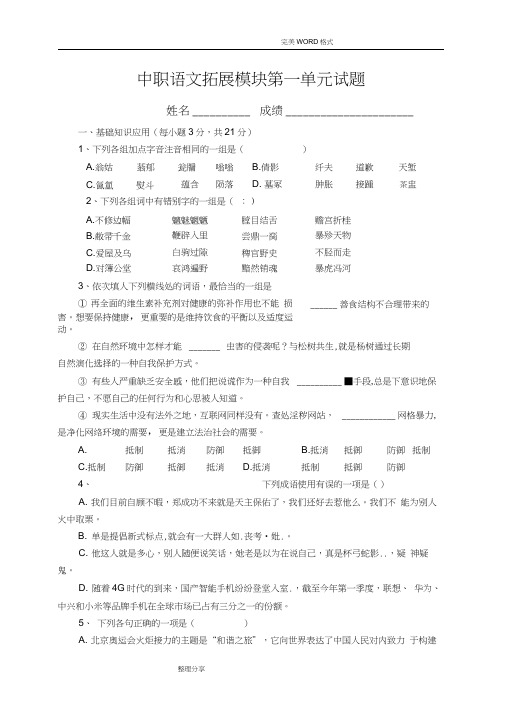
中职语文拓展模块第一单元试题姓名__________ 成绩______________________一、基础知识应用(每小题3分,共21分)1、下列各组加点字音注音相同的一组是()A.翁姑蓊郁瓮牖嗡嗡B.倩影纤夫道歉天堑C.氤氲熨斗蕴含陨落D. 墓冢肿胀接踵茶盅2、下列各组词中有错别字的一组是(: )A.不修边幅魑魅魍魉膛目结舌赡宫折桂B.敝帚千金鞭辟入里尝鼎一脔暴殄天物C.爱屋及乌白驹过隙稗官野史不胫而走D.对簿公堂哀鸿遍野黯然销魂暴虎冯河3、依次填人下列横线处的词语,最恰当的一组是①再全面的维生素补充剂对健康的弥补作用也不能损______ 善食结构不合理带来的害。
想要保持健康,更重要的是维持饮食的平衡以及适度运动。
②在自然环境中怎样才能_______ 虫害的侵袭呢?与松树共生,就是杨树通过长期自然演化选择的一种自我保护方式。
③有些人严重缺乏安全感,他们把说谎作为一种自我__________ ■手段,总是下意识地保护自己,不愿自己的任何行为和心思被人知道。
④现实生活中没有法外之地,互联网同样没有。
查处淫秽网站,____________ 网格暴力,是净化网络环境的需要,更是建立法治社会的需要。
A. 抵制抵消防御抵御B.抵消抵御防御抵制C.抵制防御抵御抵消D.抵消抵制抵御防御4、下列成语使用有误的一项是()A. 我们目前自顾不暇,郑成功不来就是天主保佑了,我们还好去惹他么。
我们不能为别人火中取栗。
B. 单是提倡新式标点,就会有一大群人如.丧考•妣.。
C. 他这人就是多心,别人随便说笑话,她老是以为在说自己,真是杯弓蛇影..,疑神疑鬼。
D. 随着4G时代的到来,国产智能手机纷纷登堂入室.,截至今年第一季度,联想、华为、中兴和小米等品牌手机在全球市场已占有三分之一的份额。
5、下列各句正确的一项是()A. 北京奥运会火炬接力的主题是“和谐之旅”,它向世界表达了中国人民对内致力于构建和谐社会,对外努力建设和平繁荣的美好世界。
中职语文拓展模块单元测试一(2024)
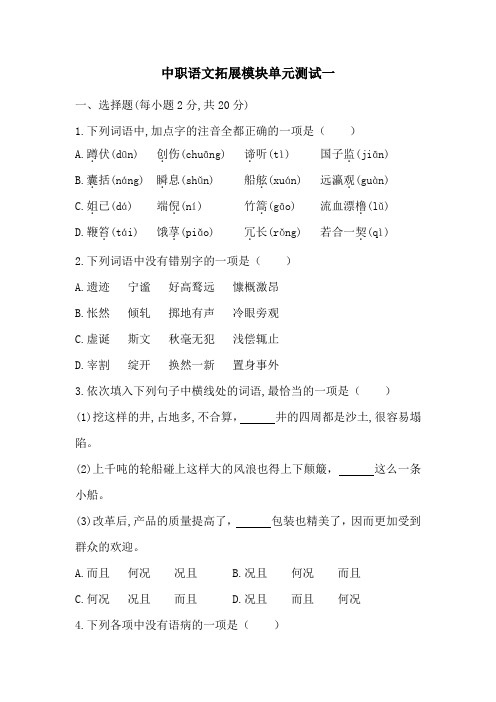
中职语文拓展模块单元测试一一、选择题(每小题2分,共20分)1.下列词语中,加点字的注音全都正确的一项是()A.蹲.伏(dūn) 创.伤(chuāng) 谛.听(tì) 国子监.(jiān)B.囊.括(náng) 瞬.息(shǔn) 船舷.(xuán) 远瀛观.(guàn)C.姐.已(dá) 端倪.(ní) 竹篙.(gāo) 流血漂橹.(lǔ)D.鞭笞.(tái) 饿莩.(piǎo) 冗.长(rǒng) 若合一契.(qì)2.下列词语中没有错别字的一项是()A.遗迹宁谧好高鹜远慷概激昂B.怅然倾轧掷地有声冷眼旁观C.虚诞斯文秋毫无犯浅偿辄止D.宰割绽开换然一新置身事外3.依次填入下列句子中横线处的词语,最恰当的一项是()(1)挖这样的井,占地多,不合算,井的四周都是沙土,很容易塌陷。
(2)上千吨的轮船碰上这样大的风浪也得上下颠簸,这么一条小船。
(3)改革后,产品的质量提高了,包装也精美了,因而更加受到群众的欢迎。
A.而且何况况且B.况且何况而且C.何况况且而且D.况且而且何况4.下列各项中没有语病的一项是()A.尝试着用“同时”代替“但是”吧。
时间长了你会发现自己多了勇气,因为情绪得到营养和保护。
B.不同题材、不同形式、不同风格的诗歌创作是否百花齐放是判断一个时代诗歌盛衰的重要标志。
C.当今的环境保护技术不仅做到了生产过程不浪费资源,不污染环境,保证产品使用的清洁高效,而且产品使用后废弃物的有效回收和循环利用。
D.不管天气十分寒冷,妈妈还是坚持天天出摊卖水果。
5.下列各句修辞手法与其他三项不同的一项是()A.树叶缝隙的阳光打在草叶的几丝脉络上,再落到地上,阳光变得如绿纱一样漂浮了。
B.北京人每个人一辈子吃的大白菜摞起来大概有北海白塔那么高。
C.忽然飘来几只沙鸥,雪片一样白,闪电一样快,在船头画了个圈儿,不见了。
D.我在伏案敲击电脑,汉字像一串串成熟的果子,噼噼啪啪溅落在屏幕上。
职高英语拓展模块(1-6单元)题库
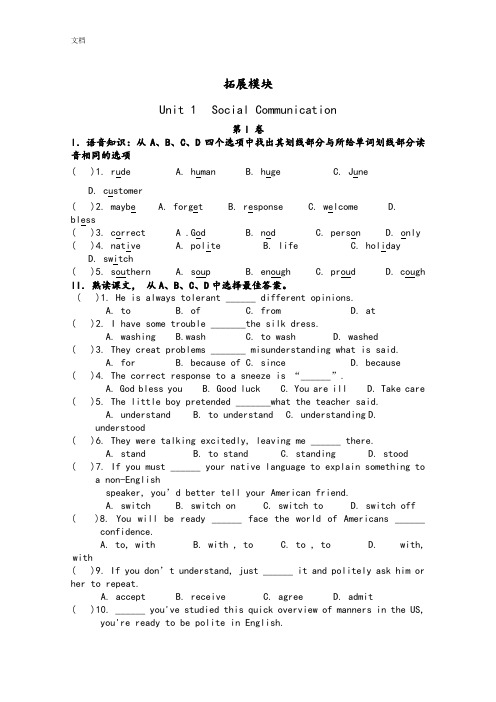
拓展模块Unit 1 Social Communication第I 卷I.语音知识:从A、B、C、D四个选项中找出其划线部分与所给单词划线部分读音相同的选项( )1. rude A. human B. huge C. JuneD. customer( )2. maybe A. forget B. response C. welcome D.bless( )3. correct A .God B. nod C. person D. only ( )4. native A. polite B. life C. holidayD. switch( )5. southern A. soup B. enough C. proud D. cough II.熟读课文,从A、B、C、D中选择最佳答案。
( )1. He is always tolerant ______ different opinions.A. toB. ofC. fromD. at( )2. I have some trouble _______the silk dress.A. washingB.washC. to washD. washed( )3. They creat problems _______ misunderstanding what is said.A. forB. because ofC. sinceD. because( )4. The correct response to a sneeze is “______”.A. God bless youB. Good luckC. You are illD. Take care ( )5. The little boy pretended _______what the teacher said.A. understandB. to understandC. understandingD.understood( )6. They were talking excitedly, leaving me ______ there.A. standB. to standC. standingD. stood( )7. If you must ______ your native language to explain something toa non-Englishspeaker, you’d better tell your American friend.A. switchB. switch onC. switch toD. switch off ( )8. You will be ready ______ face the world of Americans ______ confidence.A. to, withB. with , toC. to , toD. with, with( )9. If you don’t understand, just ______ it and politely ask him or her to repeat.A. acceptB. receiveC. agreeD. admit( )10. ______ you've studied this quick overview of manners in the US, you're ready to be polite in English.A. SoB. Now thatC. ThatD. ButIII.语法练习:从A、B、C、D四个选项中,选择最佳答案( )1._______ he’s old, he can still carry this heavy bag.A. ThoughB. SinceC. ForD. So( )2. The teacher raised his voice _______ all the students could hear him.A. forB. so thatC. becauseD. in order ( )3. It is ______ that we’d like to go out for a walk.A. a lovely dayB. too lovely a dayC. so lovely a dayD. such lovely a day( )4. Mary had ______ much work to do that she stayed at her office all day.A. suchB. soC. tooD. very( )5. _____ she goes, there are crowds of people waiting to see her.A. WhereverB. HoweverC. WhicheverD. Whoever ( )6. You must speak louder ______ you can be heard by all.A. so thatB. in order toC. becauseD. such that( )7. ______ well you can drive, you must drive carefully.A. So long asB. In order thatC. No matter howD. The moment( )8. If we work with a strong will, we can overcome any difficulty, ____great it is.A. whatB. howC. whateverD. however( )9. _______ he’s very young, _______ he knows several languages.A. Though, butB. Because, soC. Though, /D. Because,/( )10. _____ I suggest, he always disagrees.A. HoweverB. WhateverC. WhicheverD. Whoever IV. 完形填空:Last summer, my wife Jane and I went to visit the town where we both grew up. We 1 there since we were married ten years ago.2 , we went to the neighborhood where my wife spent her childhood. It hadn’t changed very much. The house3 she was born was still there, but it was now a different color. The same neighbors still lived next door. They were very glad to4 Jane, and asked us to come in and have a cup of coffee. We learned about all the neighbors, old and new. Jane had a very good5 . As fast as one question was answered, she would ask the next. “What happened6 the Dunbars who used to have the little yellow house on the corner?”, “Who bought the old Johnson place in the next block?”, “Do Fred and Martha still live down the street?”, “Whatabout Miss Burton who 7 in that extremely big house around the corner?”Then we went to see the neighborhood where I grew up. What a 8 ! It was all changed. All the old houses I remembered were 9 and in their place were some very modern ones. I didn’t know any of the people who 10 there.( ) 1. A. hadn’t been B. wasn’t C. haven’t been D. didn’t be ( ) 2. A. At the very beginning B. First C. Firstly D. For the first time( ) 3. A. that B. / C. where C. which( ) 4. A. find B. know C. meet D. see( ) 5. A. time B. ask C. home D. question( ) 6. A. with B. to C. for D. about( ) 7. A. live alone B. lives lonely C. lived alone D. stayed lonely( ) 8. A. disappoint B. disappointing C. disappointed D. disappointment( ) 9. A. gone B. ruins C. there D. the same( ) 10. A. worked B. stayed C. studied D. livedV. 阅读理解AEducation for Japanese children is free for the first nine years and all children must go to school six years of primary schooling and three years of secondary schooling. In the primary and secondary schools, about 99.9 per cent of school-age children are present. School usually begins at 8 o'clock in the morning and ends at 3 o'clock in the afternoon on weekdays and at noon on Saturdays. The school begins in April and ends in March. There is a summer holiday in August and a winter holiday during the New Year season.After nine years of schooling, students can enter the three-year high school by passing an examination and by paying a small charge each year. After high school, students can go on to study at various types of colleges, usually for four years. There are also two-year junior colleges.( ) 1. The passage mainly discusses about ______.A.c olleges in JapanB.f ree education in JapanC.e ducation in Jap anD.s chool time in Japan( ) 2. How many days have the Japanese students to go to school every week?A.N ot known.B.F our and half days.C.F ive days.D.F ive and a half days.( ) 3. If a student wants to go to a high school in Japan, he or she must ______.A.p ay a large amount of moneyB.s tudy at primary and secondary school for 9 yearsC.t ake part in (参加) the exam and pay a little moneyD.p ass the exam and pay a little money( ) 4. What is mentioned in the passage?A.T ypes of colleges.B.P erio ds for different schoolings.C.T he teaching staff (教职员工).D.T he number of children attending schools.( ) 5. According to the passage what is true?A.A lmost all Japa nese children have school education.B.J apanese schools have three vacationsC.J apanese children have freedom to choose schools.D.W eekdays are from Monday to Sunday.BFrom a plane we can see the fields, cities, mountains or seas below. If we go into space, we see more and more of the earth. People and man-made satellites have been sent out into space to look at the earth carefully and people have learnt more about the earth in the last few years.The sea looks very beautiful when the sun is shining on it. But it can be very terrible when there is a strong wind.The sea is very big. It nearly covers three quarters of the earth. The sea is also very deep in some places. There is one place and at that place the sea is about 11 kilometers deep. The highest mountain in the world is about 9 kilometers high. If that mountain was put into the sea at that place, there would be still 2 kilometers of water above it!In most parts of the sea, there are many kinds of fishes and plants. Some live near the top of the sea. Others live deep down. There are also a lot of small living things, and lots of fishes live by eating them. The sea can be very cold. When people go down, the sea becomes colder and colder. Only some men can go down into the deep sea. But, in 1970, five women scientists (科学家) lived in the deep sea for fourteen days.()6. This passage is_________.A. a short storyB. for science readingC. a piece of newsD. a report()7. The sea covers about _______of the earth.A One third B. One fourthC. Two quartersD. Three fourths()8. _______are not mentioned (提及) in this passage.A. IslandsB. FishesC. PlantsD. Livingthings()9. Which of the following is NOT true?A. The sea is usually beautiful when the sun is shining.B. The sea is always very terrible when the wind blows hard.C. The highest mountain is in the deepest place of the sea.D. The deeper the people go into the sea, the colder they will feel. ()10. The last sentence “But, in 1970, five women scientists lived in the deep sea for fourteen days.” means that________.A. women wanted to live in the deep sea for a long timeB. women could go deeper into the sea than menC. women liked living in the deep sea better than menD. women could do the same work as men第II卷I.单词拼写:根据下列句子及所给汉语注释,在横线上写出单词的正确形式1. No matter what we said, he ______(假装)that he knew nothing about it.2. The ________( 观众) enjoyed every minute of the performance.3. The naughty boy ________(承认)that did it with his father’s help.4. Sorry,I can’t __________(解释)why I am engaged in that job.5. The best way to practice English is to talk with a _________( 本国的) speaker.II.词形变换:用括号内单词的适当形式填空1.I became ________(annoy) when I felt that he pretended to understandwhat I meant.2.He _____(polite)asked the man to give a correct response.3.Work hard and you’ll have _________ (confident ) to face the challengeof life.4.The boy felt _____ (lose)when he heard something he didn’t understand.5.She created some problems because of _______(misunderstand) what herboss said.III.词义搭配:从B栏中选出A栏单词的正确解释A B( ) 1.tolerant A. man, woman or child, not an animal( ) 2. rude B. say or do something again( ) 3. native C. sudden burst of air from the nose and mouth( ) 4. repeat D. accepting what one doesn’t like( ) 5. human E. belonging to or being the place of one’s birth( ) 6. conversation F. fit, right( ) 7. admit G. informal talk( ) 8. sneeze H. agree to the truth of usually somethingbad( ) 9. suitable I. an answer or an action done in answer( ) 10. response J. not politeIV.补全对话。
高教版拓展模块第一单元试卷B卷
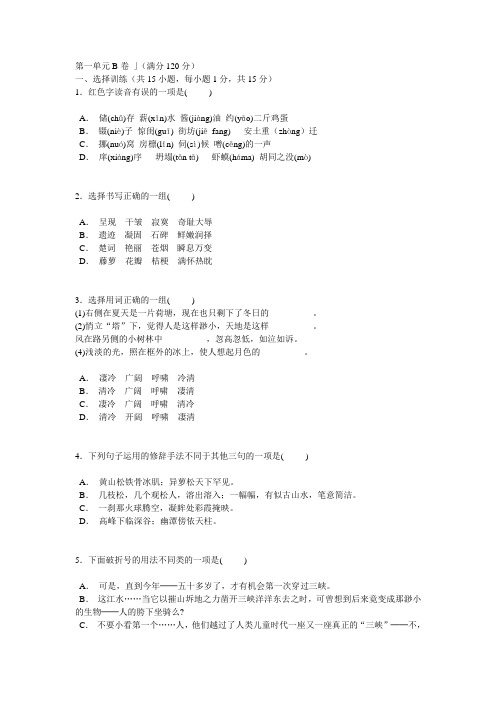
第一单元B卷」(满分120分)一、选择训练(共15小题,每小题1分,共15分)1.红色字读音有误的一项是()A.储(chǔ)存薪(xīn)水酱(jiàng)油约(yāo)二斤鸡蛋B.镊(niè)子惊闺(guī) 街坊(jiēfang)安土重(zhòng)迁C.挪(nuó)窝房檩(lǐn) 伺(sì)候噌(cēng)的一声D.庠(xiáng)序坍塌(tān tā)虾蟆(háma) 胡同之没(mò)2.选择书写正确的一组()A.呈现干皱寂寞奇耻大辱B.遗迹凝固石碑鲜嫩润择C.楚词艳丽苍烟瞬息万变D.藤萝花瓣桔梗满怀热眈3.选择用词正确的一组()(1)右侧在夏天是一片荷塘,现在也只剩下了冬日的__________。
(2)悄立“塔”下,觉得人是这样渺小,天地是这样__________。
风在路另侧的小树林中__________,忽高忽低,如泣如诉。
(4)浅淡的光,照在框外的冰上,使人想起月色的__________。
A.凄冷广阔呼啸冷清B.清冷广阔呼啸凄清C.凄冷广阔呼啸清冷D.清冷开阔呼啸凄清4.下列句子运用的修辞手法不同于其他三句的一项是()A.黄山松铁骨冰肌;异萝松天下罕见。
B.几枝松,几个观松人,溶出溶入;一幅幅,有似古山水,笔意简洁。
C.一刹那火球腾空,凝眸处彩霞掩映。
D.高峰下临深谷;幽潭傍依天柱。
5.下面破折号的用法不同类的一项是()A.可是,直到今年──五十多岁了,才有机会第一次穿过三峡。
B.这江水……当它以摧山坼地之力凿开三峡洋洋东去之时,可曾想到后来竟变成那渺小的生物──人的胯下坐骑么?C.不要小看第一个……人,他们越过了人类儿童时代一座又一座真正的“三峡”──不,他们的步履更为艰难,他们的业绩更为伟大。
D.他们被一个钢铁的意志──党的意志团结在一起,正在向新的“三峡”进军。
6.依次填入下列各句横线处的词语,恰当的一组是()①北京人爱热闹,但是不爱管闲事。
职高拓展模块下第一单元测试B卷(有答案)分析
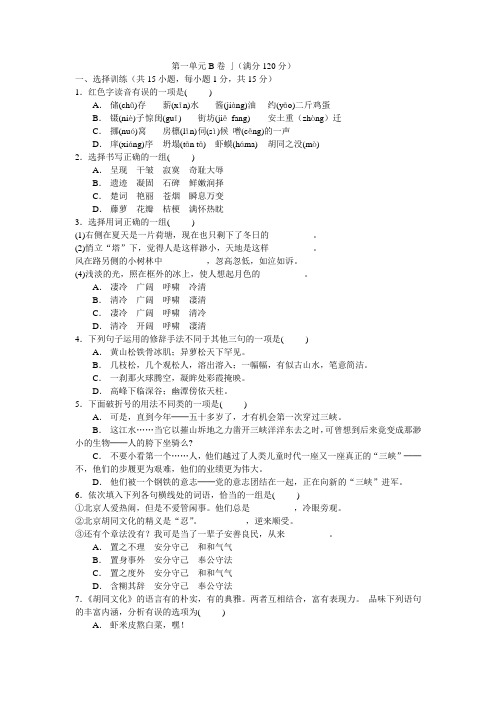
(1)第①段的中心句为(不超过30字)(2分):
(2)第②段的中心句为(限12字)(1分):
2.从语序的角度分析,第①段有一个倒装式句子,请注意筛选:
(1)这个句子的倒装部分为(1分):
(2)若将全句梳理和调整一下,其正常语序为(2分):
3.语段告诉我们胡同里的居民有何种心态?其封闭性表现在何处?
B.(1)(2)/(3)(4)/(5)
C.(1)/(2)(3)(4)/(5)
D.(1)/(2)(3)/(4)(5)
10.下列词语中红色字解释正确的一项是()
A.不约而同:约,约定。
B.安土重迁:重,重新。
C.冷眼旁观:冷,冰冷。
D.忠心耿耿:耿耿,心事重。
11.《胡同文化》一文中,作者认为北京胡同文化的精义是()
通过一位阅历丰富的老人之口,北京人骄傲自大的神气毫厘毕现。
8.下面红色的词语意思基本相同的一组是()
A.(1)人类的历史,对于我本来如同远在云天之上,不可端睨的飞鸟。
(2)时间过去了半年多,事情已初露端睨。
B.(1)它以摧山坼地之力凿开三峡洋洋东去。
(2)一部《水浒传》,洋洋洒洒百万言,作者却并不滥用笔墨。
③这里春红已谢,没有赏花的人群,也没有蜂围蝶阵。有的就是这一树闪光的、盛开的藤萝。花朵儿一串挨着一串,一朵接着一朵,彼此推着挤着,好不活泼热闹!
④每一穗花都是上面的盛开、下面的待放。颜色便上浅下深,好像那紫色沉淀下来了,沉淀在最嫩最小的花苞里。每一朵盛开的花像是一个张满了的小小的帆,帆下带着尖底的舱,船舱鼓鼓的;又像一个忍俊不禁的笑容,就要绽开似的。那里装的是什么仙露琼浆?我凑上去,想摘一朵。
4.下列句子运用的修辞手法不同于其他三句的一项是()
职高拓展模块下第一单元测试B卷(有答案解析)
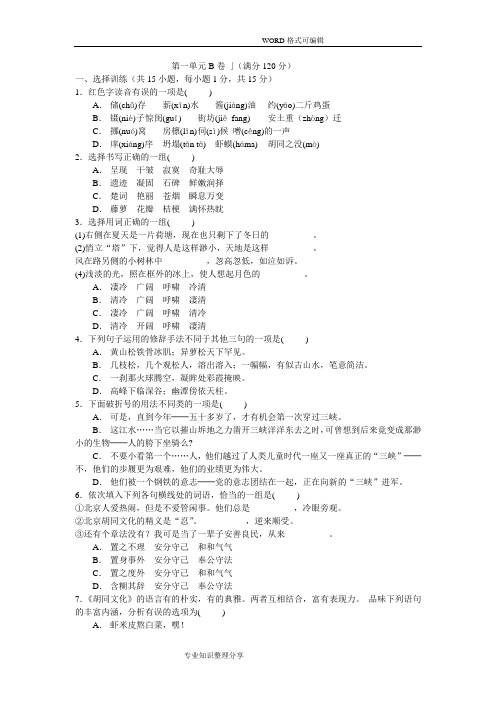
第一单元B卷」(满分120分)一、选择训练(共15小题,每小题1分,共15分)1.红色字读音有误的一项是()A.储(chǔ)存薪(xīn)水酱(jiàng)油约(yāo)二斤鸡蛋B.镊(niâ)子惊闺(guī) 街坊(jiēfang)安土重(zhòng)迁C.挪(nuó)窝房檩(lǐn) 伺(sì)候噌(cēng)的一声D.庠(xiáng)序坍塌(tān tā)虾蟆(háma) 胡同之没(mò)2.选择书写正确的一组()A.呈现干皱寂寞奇耻大辱B.遗迹凝固石碑鲜嫩润择C.楚词艳丽苍烟瞬息万变D.藤萝花瓣桔梗满怀热眈3.选择用词正确的一组()(1)右侧在夏天是一片荷塘,现在也只剩下了冬日的__________。
(2)悄立“塔”下,觉得人是这样渺小,天地是这样__________。
风在路另侧的小树林中__________,忽高忽低,如泣如诉。
(4)浅淡的光,照在框外的冰上,使人想起月色的__________。
A.凄冷广阔呼啸冷清B.清冷广阔呼啸凄清C.凄冷广阔呼啸清冷D.清冷开阔呼啸凄清4.下列句子运用的修辞手法不同于其他三句的一项是()A.黄山松铁骨冰肌;异萝松天下罕见。
B.几枝松,几个观松人,溶出溶入;一幅幅,有似古山水,笔意简洁。
C.一刹那火球腾空,凝眸处彩霞掩映。
D.高峰下临深谷;幽潭傍依天柱。
5.下面破折号的用法不同类的一项是()A.可是,直到今年──五十多岁了,才有机会第一次穿过三峡。
B.这江水……当它以摧山坼地之力凿开三峡洋洋东去之时,可曾想到后来竟变成那渺小的生物──人的胯下坐骑么?C.不要小看第一个……人,他们越过了人类儿童时代一座又一座真正的“三峡”──不,他们的步履更为艰难,他们的业绩更为伟大。
D.他们被一个钢铁的意志──党的意志团结在一起,正在向新的“三峡”进军。
6.依次填入下列各句横线处的词语,恰当的一组是()①北京人爱热闹,但是不爱管闲事。
职高英语(拓展模块)1-2单元测试题
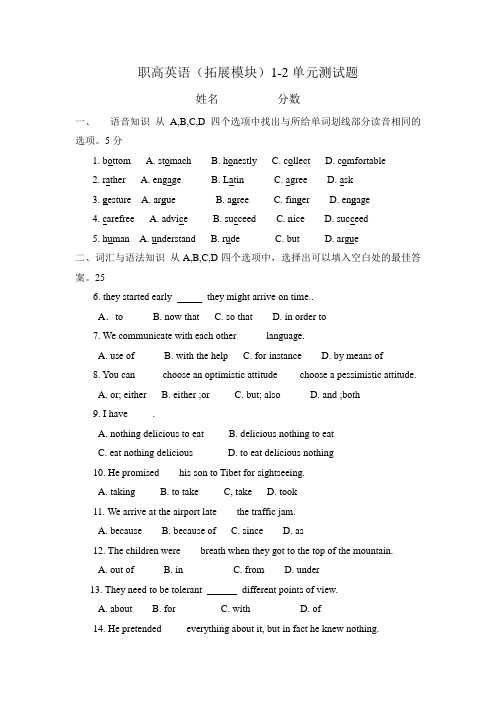
职高英语(拓展模块)1-2单元测试题姓名分数一、语音知识从A,B,C,D四个选项中找出与所给单词划线部分读音相同的选项。
5分1. bottom A. stomach B. honestly C. collect D. comfortable2. rather A. engage B. Latin C. agree D. ask3. g esture A. ar g ue B. a g ree C. fin g er D. en g age4. carefree A. advice B. succeed C. nice D. succeed5. human A. understand B. rude C. but D. argue二、词汇与语法知识从A,B,C,D四个选项中,选择出可以填入空白处的最佳答案。
256. they started early they might arrive on time..A.to B. now that C. so that D. in order to7. We communicate with each other _____ language.A. use ofB. with the helpC. for instanceD. by means of8. You can _____choose an optimistic attitude____ choose a pessimistic attitude.A. or; eitherB. either ;orC. but; alsoD. and ;both9. I have ____ .A. nothing delicious to eatB. delicious nothing to eatC. eat nothing deliciousD. to eat delicious nothing10. He promised ___ his son to Tibet for sightseeing.A. takingB. to take C, take D. took11. We arrive at the airport late ___ the traffic jam.A. becauseB. because ofC. sinceD. as12. The children were ___ breath when they got to the top of the mountain.A. out ofB. inC. fromD. under13. They need to be tolerant different points of view.A. aboutB. forC. withD. of14. He pretended ____ everything about it, but in fact he knew nothing.A. to knowB. knowC. knowingD. known15. Every time she arrives home and sees her daughter, she will be ____.A. in good moodB. in a good moodC. in the good moodD. in better mood16. I have trouble in the text.A. understandB. understandingC. to understand D .understood17.These tools(工具)______ the fields.A. used to plough(犁地)B. are used to ploughC. used for ploughD. used to ploughing18. when someone sneezes, you should say:A. Excuse meB. God bless youC. Thank youD. I’m fine, thanks19. “Ok gesture” in Japan meansA. very goodB. moneyC. low tasteD. goodbye20.They will succeed in the exam.A. passingB. to passC. passD. passed21.The story is so that I am very in it..A. interesting ; interestedB. interesting; to interestC. interested ;to interestD. interested;interesting22 _____ the doctor, I’m well again..A. ThanksB. thank youC. Thanks toD. Thank to23.We all know oranges ___ vitamin C.A. are low onB. are poor inC. are rich inD. are high on24. Why not at once?A. to goB. wentC. will goD. go25. You’d better at once.A. to goB. wentC. will goD. go26.____ more attention,the trees could have grown better.A.Given B.To give C.Giving D.Having given27. Who is the man by the door?A. stoodB. to standC. standingD. stand28. from the space(太空),the earth(地球) looks blue..A. seeB. to seeC. seeingD. seen29.He had his bike .A. repairB. to repairC. repairedD. repairing30. He saw his mother the clothes yesterday evening.A. washingB. to washC. washedD. wash三、完型填空money. Why? Because when money is spent, we can get it back. However, whenBut it is a pity that there are a lot of people who do not know the importance of the( ) 1. A. much B. less C. mush less D. even more( ) 2. A. cost B. bought C. gone D. finished( ) 3. A. return B. carry C. take D. bring( ) 4. A. what B. that C. because D. why( ) 5. A. money B. time C. day D. food( ) 6. A. nothing B. something C. anything D. everything( ) 7. A. reading B. writing C. playing D. working( ) 8. A. time B. food C. money D. life( ) 9. A. stop B. leave C. let D. give( ) 10.A. lose B. save C. spend D. take四、阅读理解AAn old man died and left his son a lot of money. But the son was a foolishyoung man, and he quickly spent all the money, so that soon he had nothing left. Of course, when that happened, all his friends left him. When he was quite poor and alone, he went to see Nasreddin, who was a kind, clever old man and often helped people when they had troubles. "My money has finished and my friends have gone,” said the young man. "What will happen to me now?""Don't worry, young man," answered Nasreddin. "Everything will soon be all right again. Wait and you will soon feel much happier." The young man was very glad. "Am I going to get rich a gain then?”He asked Nasreddin. "No, I didn't mean that," said the old man.” I meant that you would soon get used to being poor and to having no friends."( ) 41.An old man died and left his son_____.A. nothingB. some goldC. much moneyD. only a house( ) 42.When the son was_____ , he went to see Nasreddin.A. short of moneyB. quite poor and sickC. in troubleD. quite poor and alone( )43.The young man was very glad because Nasreddin said that____.A. he would become rich againB. he would soon feel much happierC. he would become cleverD. he would have more friends( ) 44.Nasreddin meant the young man______.A. would get rich againB. would get used to having nothingC. would get used to being in troubleD. would get out of poorness ( ) 45.What this story tells us is________.A. that money is everythingB. that money makes the mare goC. to save each pennyD. that misfortune tests the sincerity of friendsB.About 300 years ago man began to study the nature’s color. The famous English scientist, Issac Newton, did the experiments in 1665, which are even the basis for much of our knowledge of colors today. He found that when he passed a narrow beam of sunlight or “white light” through a prism(棱镜),the white split into a colored beam. This colored beam was made up of violet, blue, green, indigo, yellow, orange and red. People called it a spectrum later.He also found that he could pass the color spectrum through another prism and produce white light. Thus, Newton first discovered that white light was a mixture of all the colors.46. When did man begin to study nature‘s colors?A. For 300 years.B. In 1700’s.C.300 years laterD. in 1970’s47. How many colors make up the colored beam that was called a spectrum?A. FiveB. SixC. SevenD. Eight48. Can you guess the meaning of the word “spectrum”?A. 光线B.光芒C.光缆D.光谱49. Which of the following titles can be best summarize the passage?A. Newton’s DiscoveryB. Nature’s ColorsC. How to use a prismD. What is color?50. Which of the following is not included in a white beam?A. Red b.B. BrownC. YellowD. Green五、词义搭配A B.51. hate A. method or way52. means B. dislike, be tired of53. nod C. informal talk54. conversation D. in the open air55. indeed E. move the head down and then up again to showagreement56. outdoors F. truly; really; certainly57. tolerant G. allowing people to do or say what they want towithout punishing them58.bottom H. impolite; showing no respect to sb.59 mood I state of one’s feelings or mind at a particular time60. rude J lowest part of sth.六、单词拼写1.Tom is a_____ (精力充沛的) young man2.He (假装) that he knows all the thing in the world.3.Why not ______(选择) the one we love and live happily.4.There came a _____ (可爱的) dog。
职高第一单元测试题及答案
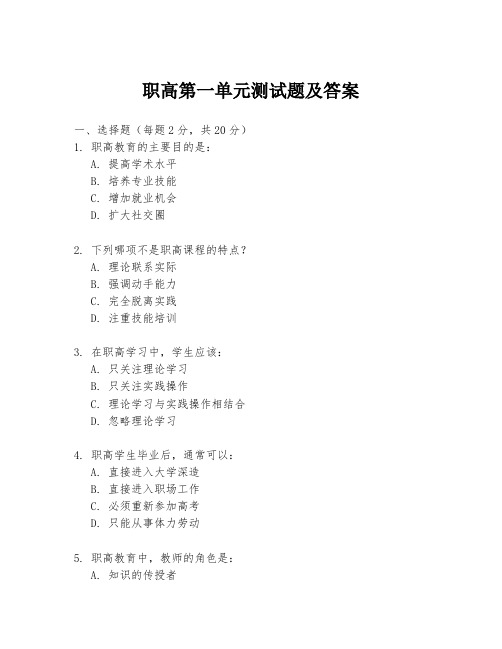
职高第一单元测试题及答案一、选择题(每题2分,共20分)1. 职高教育的主要目的是:A. 提高学术水平B. 培养专业技能C. 增加就业机会D. 扩大社交圈2. 下列哪项不是职高课程的特点?A. 理论联系实际B. 强调动手能力C. 完全脱离实践D. 注重技能培训3. 在职高学习中,学生应该:A. 只关注理论学习B. 只关注实践操作C. 理论学习与实践操作相结合D. 忽略理论学习4. 职高学生毕业后,通常可以:A. 直接进入大学深造B. 直接进入职场工作C. 必须重新参加高考D. 只能从事体力劳动5. 职高教育中,教师的角色是:A. 知识的传授者B. 技能的培养者C. 学生的管理者D. 以上都是6. 职高课程设置通常包括:A. 单一学科课程B. 跨学科课程C. 只包含理论课程D. 只包含实践课程7. 职高学生在学习过程中,应该:A. 完全依赖教师指导B. 独立完成所有任务C. 与同学合作学习D. 只关注个人成绩8. 职高教育对学生的期望是:A. 成为学术研究者B. 成为专业技能人才C. 成为企业管理者D. 成为社会活动家9. 在职高教育中,学生通常需要:A. 参加各种竞赛B. 完成大量书面作业C. 参与实习和实训D. 进行长时间的学术研究10. 职高教育与普通高中教育的主要区别在于:A. 学习时间不同B. 学习内容不同C. 学习地点不同D. 学习方式不同答案:1. B2. C3. C4. B5. D6. B7. C8. B9. C 10. B二、填空题(每空1分,共10分)1. 职高教育注重培养学生的_________和_________。
2. 职高学生在学习过程中,应该学会_________和_________。
3. 职高教育的课程设置通常包括_________和_________。
4. 职高学生毕业后,通常具备_________和_________的能力。
5. 职高教育与普通高中教育的区别在于,职高更注重_________。
中职语文拓展模块第一单元试题
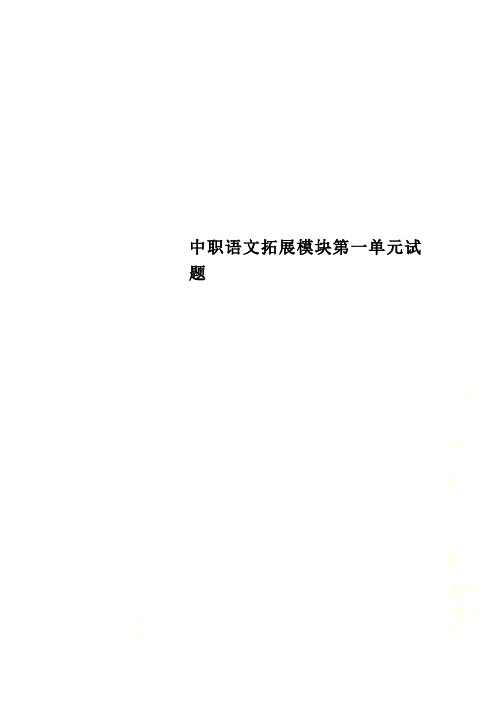
中职语文拓展模块第一单元试题共赢。
“niiu”的模式有两个主要特点。
第一,充分利用了纸质媒体的优势,并对纸质媒体具有积极的促进作用。
网络媒体提供的新闻时常被人批评缺乏公信力,而“niiu”的合作伙伴多是具有广泛影响力的优秀报纸,使其内容得到保障。
“niiu”的内容供应商依据其被选择的内容数量获取利润,从而增加了额外收入,提高了“隐形”发行量。
这种网上发行还促使传统媒体在提升新闻品质上更下功夫,增强竞争力。
此外,传统媒体还可以通过分析“n iiu”订户选择文章的偏好,辅助调整报纸的内容定位。
第二,这种新的形式开拓了纸媒的潜在阅读群,使广告投放更加精准,并带动了“网际”印刷。
“niiu”的目标读者群主要是学生,因为他们更愿意尝试和接受新生事物,这种新形式为重构报纸与年轻人之间的关系做出了有益的尝试。
对广告商而言,个性化报纸使他们有可能实现更具有针对性、更有效的广告投放,使广告效益最大化。
“niiu”还实现了网络媒体与印刷行业之间的新合作,推动“网际”印刷技术的发展。
利用新科技、新理念,赋予读者更大权利,让读者参与到报纸定制中来,既旧又新的“niiu”给了我们一个网络时代报纸生存的全新答案。
8、下列育关“niiu”报纸的表述,不符合原意的一项是()A.根据读者从网上选择的不同内容编成的报纸B.根据读者不同阅读习惯而选择不同纸张形式的报纸C.由订户自己主编内容、网站排版和印刷的报纸D.利用了新科技、新理念,既旧又新的报纸9、下列对“niiu”模式可能产生的效果的表述,不准确的一项是()A.它让网络媒体和纸质媒体在竞争与对抗中实现了互动、互补和共赢。
B.它让内容合作伙伴可以依据其被选择内容的数量而获取额外收入,也提高了其报纸的发行量。
C.它辅助传统媒体调整了内容定位,也吸引了广告商更有针对性、更为有效的广告投放。
D.它充分利用了纸质媒体的优势,让读者参与到报纸定制中来,开拓了纸质媒体的潜在阅读群。
10、下列推断,符台原文内容的一项是()A.“niiu”让报纸从固定套餐变成了菜式丰富的自助餐,能改变读者阅读习惯,养成鲜明个性。
职高英语基础模块下unit1测试题
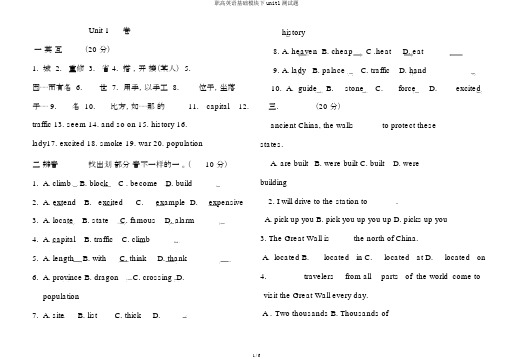
Unit 1卷一英互(20分)1.城2. 重修3. 省4. 搭,开接(某人)5.因⋯⋯而有名 6.世7.用手,以手工8.位于,坐落于⋯⋯ 9.名10.比方,如⋯⋯那的11. capital12. traffic 13. seem 14. and so on 15. history 16.lady17. excited 18. smoke 19. war 20. population二辨音找出划部分音不一样的一。
(10 分)1. A. climb B. block C . become D. build2. A. extend B. excited C.example D.expensive3. A. locate B. state C. famous D. alarm4. A. capital B. traffic C. climb5. A. length B. with C. think D. thank6. A. province B. dragon C. crossing D.population7. A. site B. list C. thick D.history8.A. heaven B. cheap C .heat D. eat9.A. lady B. palace C. traffic D. hand10. A. guide B. stone C.force D.excited三.(20分)ancient China, the walls ______to protect thesestates.A. are builtB. were builtC. builtD. werebuilding2.I will drive to the station to ______.A. pick up youB. pick you up you up D. picks up you3.The Great Wall is _____the north of China.A. locatedB.located inC. located atD. located on4. _______ travelers from all parts of the world come to visit the Great Wall every day.A .Two thousands B. Thousands ofC. ThousandD. Thousands5. _____of water ________.A. Two thirds , is wastedB.Two third , are wastedC. Two thirds ,are wastedD. Second third , is wasted letter is ________.A. 5 hundred wordB. 5 hundreds wordC. 5-hundreds-wordD. 5 hundred words7.The young lady is made ____another house to live in.A.findB. to findC. foundD. finding8.They will arrive ___ Beijing at 8 :00A.atB. inC. onD. for9.Yao Ming is ________.A.meter tallB.C. meters tall–tallYan is famous ______his novel.A. forB. asC. atD. from 11.Can ’t you imagine the ancient people built theGreat Wall____A. by handsB. by the handC. by handD. by theirhands12.Xiao Lin is one of the best _____.A. a teacherB. teacherC. teachersD. teaches13.____ is said ____thousands of people died fromthe big earthquake.A. It ,thatB.It , whatC. That ,whatD. That ,that14.It ___them more than ten years _____the Great Wall. A. took , building B. took ,to buildC. spent , buildingD. spent , to build15.The girl is wearing the sunglasses to protect hereyes ____the sunlight.A. fromB. inC. withD. at16. They were _____at hearing the good news.A. excitedB. exciteC. excitingD. excites17.The houses were _____by the workers. A.rebuild B. rebuilt C. rebuilds D. rebuilded18.We bought a lot of fruityesterday ,____apples ,oranges , etc.A. such asB. suchC. as suchD. for example19. There are a lot of ______around the city. A.place of interest B. places of interestC. places of interestingD. place of interesting20.The Great Wall is one of the world ’s ______wonders A. famous B most famousC. more famousD. much famous四.完形填空(10分)Jim Green is an announcer( 播音员) for the program. Most of the girls___1____ boys like the program. They___2___like Jim Green. Some of them often make phone calls to him and thank him ___3___ his work.There are lots of ___4___ to him every day, too.Jim Green gets up at 6:00 every morning .He has bread and a glass of milk ___5___ breakfast.He leaves home at6:30and ___6___ his office at7:15.The program ___7____ at 7: plays the new records (唱片) of the pop songs and modern music for his listeners.At 8:00it's time ____8____ the news.Jim finishes work at 10:30.He goes home____9____ his car .He ___10___ newspaper and listens to music after supper.He thinks his life is very interesting.and B with C but D abouttoo B to C also D soto B for C for D andletter B letters C friends D wordsat B with C for D togoes B gets C gets to D gets upbegins B finishes C over D startto B for C of D inby B in C on D takeslooks B reads C sees D watches五.阅读(20 分)A(5 分)Do you need friends I'm sure your answer is "Yes,of course.Everybody does! " You need friends when you play and when you work. If you have friends, you will feel happy. If you have no friends.you will feel lonely( 孤独的 ). Do you know how to makefriends There is only one good way ―You make friends by being friendly. Afriendly person is interested in other people. He is always helpfulIf you want to makefriends with a new classmate, you can talk with him, tell him about the other classmates in your class and try your best to be helpful to him.1.We need friends __________.A.because we must play with themB.Because we must work with themC.when we play and when we workD. when we talk with them2. If we want to make friends, we should __________.A. be politely to themB. be friendly to them.C. be afraid of themD. when we talk with them.3. A friendly person is _________ other people.A. interested inB.worried aboutC. surprised atD.like them4. If we want to make friends with a new classmate, ___________.A. we can talk with themB. we must try to help himC. we can tell him about the other classmates in our classD.A 、B and C5.Which of the following is trueA. No one needs friends.B. Everyone needs friends.C. Only classmates need friends.D. Someone needs friends.B(5 分)Mr Smith mademany tests( 作试验 ) with different animals and the monkey was the cleverest of all the animals. One day Mr Smith puta monkey in a room. He also put some small boxes in it. In one ofthe boxes there was some food. " How long will it take the monkeyto find the food " Mr Smith said to himself. " Let mewait and see. "He left the room and waited outside. Three minutes later,he put his eye to the keyhole (钥匙眼 ). What did he see He saw the eyeof the monkey. The monkey was on the other side of the door andlooked at Mr Smith through the keyhole.1. Mr Smith made tests with __________.A. different animalsB. the monkey onlyC. all the monkeysD. all of the cleverest animals2.There was some food in _______ of the small boxes.A. someB. noneC. oneD. each3.Mr Smith put a monkey and some boxes in a room becausehe wanted to know___________.A. how much food monkey could findB. how many boxes the monkey could carryC. how long it would take the monkey to put its eye tothe keyholeD. how long it would take the monkey to find the food4. What was the monkey doing when Mr Smith was putting his eye to the keyholeA. The monkey was eating food.B. The monkey was looking for food.C. The monkey was eating on the other side of the door.D. The monkey was looking at Mr Smith through the keyhole.5. Mr Smith is a ________.A. teacherB. scientist( 科学家 )C. doctorD.farm workerC(10 分)Once upon a time, there lived a rich man. He had a servant (仆人). He and the servant( 佣人) loved wine and good food very much. Each time the rich man left his home, the servant would drink thewine and eat up all the nice food in the house. The rich man knewwhat his servant did, but he had never caught his servant doingthat.One morning, whenhe left home, he said to the servant,“Here are two bottles of poison (毒药) and some nice food in the house. You must take care of them.” With these words, he went out.But the servant knew that the rich man had said was untrue. After the rich man was away from his home, he enjoyed a nice meal. Because he drank too much, he was drunk and fell to the ground.When the rich man came back, he couldn’ t find his food and his wine. He becamevery angry. He woke the servant up. But the servant told his story very well. He said a cat had eaten up everything.He was afraid to be punished, so he drank the poison to kill himself.1 .In the story, _______ liked wine and good food very much.A. the rich manB. the servantC. both A and BD. neither A and Brich man knew that it was _______ that drank the wine and ate upall the nice food.A. the catB. himselfC. nobodyD. the servantrich told the servant that there was poison in the two bottles,because ________.A. there was in fact poison in the bottlesB. he did not want the servant to drink his wineC. he wanted to kill the catD. he wanted to kill the servantfact, _______ ate all the nice food and drank the wine.A. the servantB. catC. the rich manD. nobodythe story, we know that the servant is very _______.A. lazyB. badC. cleverD. kind六改。
中职语文拓展模块第一单元练习题(2024)
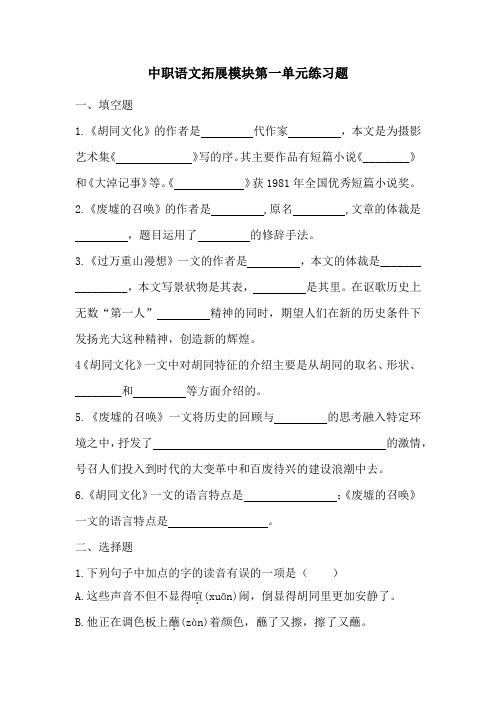
中职语文拓展模块第一单元练习题一、填空题1.《胡同文化》的作者是代作家,本文是为摄影艺术集《》写的序。
其主要作品有短篇小说《________》和《大淖记事》等。
《》获1981年全国优秀短篇小说奖。
2.《废墟的召唤》的作者是 ,原名 ,文章的体裁是,题目运用了的修辞手法。
3.《过万重山漫想》一文的作者是,本文的体裁是_______ _________,本文写景状物是其表,是其里。
在讴歌历史上无数“第一人”精神的同时,期望人们在新的历史条件下发扬光大这种精神,创造新的辉煌。
4《胡同文化》一文中对胡同特征的介绍主要是从胡同的取名、形状、________和等方面介绍的。
5.《废墟的召唤》一文将历史的回顾与的思考融入特定环境之中,抒发了的激情,号召人们投入到时代的大变革中和百废待兴的建设浪潮中去。
6.《胡同文化》一文的语言特点是;《废墟的召唤》一文的语言特点是。
二、选择题1.下列句子中加点的字的读音有误的一项是()A.这些声音不但不显得喧.(xuān)闹,倒显得胡同里更加安静了。
B.他正在调色板上蘸.(zàn)着颜色,蘸了又擦,擦了又蘸。
C.那时的我们,是何等慷慨激昂,是何等的满怀热忱.(chén)。
D.对于显赫.(hè)的汉唐,它只能称为“废都”。
2.下列选项中没有错别字的一项是()A.睡不着,别烦躁,别起急,咪着。
北京人,真有你的!B.冰中透出枝枝荷埂,枯梗上漾着绮辉。
C.于是,他用竹篙一点,独木船开动了……D.我唱着它的时侯,唱不出声的却常常是想到了夸父逐日渴死在去海的路上的悲状。
3.依次填入下列文段横线处的词语,最恰当的一项是()在他之前必定已有许多个,只是半路折回,中途遇险,没有走完三峡的全程而已。
折回的和遇险的为探明三峡的航道尽了力,也给后来者增加了精神负担。
A.或者或者都但B.有的有的不仅而且C.或者或者不仅而且D.有的有的都但4.对下列句子中加点词的解释,不正确的一项是()A.住在胡同里的居民大都安土重迁....,不大愿意搬家。
职高拓展模块下第一单元测试B卷(有答案)
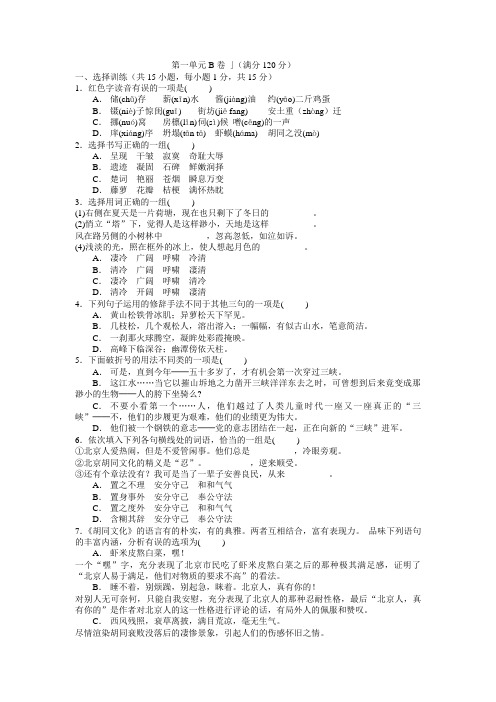
第一单元B卷」(满分120分)一、选择训练(共15小题,每小题1分,共15分)1.红色字读音有误的一项是()A.储(chǔ)存薪(xīn)水酱(jiàng)油约(yāo)二斤鸡蛋B.镊(niè)子惊闺(guī) 街坊(jiē fang)安土重(zhòng)迁C.挪(nuó)窝房檩(lǐn) 伺(sì)候噌(cēng)的一声D.庠(xiáng)序坍塌(tān tā)虾蟆(háma) 胡同之没(mò)2.选择书写正确的一组()A.呈现干皱寂寞奇耻大辱B.遗迹凝固石碑鲜嫩润择C.楚词艳丽苍烟瞬息万变D.藤萝花瓣桔梗满怀热眈3.选择用词正确的一组()(1)右侧在夏天是一片荷塘,现在也只剩下了冬日的__________。
(2)悄立“塔”下,觉得人是这样渺小,天地是这样__________。
风在路另侧的小树林中__________,忽高忽低,如泣如诉。
(4)浅淡的光,照在框外的冰上,使人想起月色的__________。
A.凄冷广阔呼啸冷清B.清冷广阔呼啸凄清C.凄冷广阔呼啸清冷D.清冷开阔呼啸凄清4.下列句子运用的修辞手法不同于其他三句的一项是()A.黄山松铁骨冰肌;异萝松天下罕见。
B.几枝松,几个观松人,溶出溶入;一幅幅,有似古山水,笔意简洁。
C.一刹那火球腾空,凝眸处彩霞掩映。
D.高峰下临深谷;幽潭傍依天柱。
5.下面破折号的用法不同类的一项是()A.可是,直到今年──五十多岁了,才有机会第一次穿过三峡。
B.这江水……当它以摧山坼地之力凿开三峡洋洋东去之时,可曾想到后来竟变成那渺小的生物──人的胯下坐骑么?C.不要小看第一个……人,他们越过了人类儿童时代一座又一座真正的“三峡”──不,他们的步履更为艰难,他们的业绩更为伟大。
D.他们被一个钢铁的意志──党的意志团结在一起,正在向新的“三峡”进军。
6.依次填入下列各句横线处的词语,恰当的一组是()①北京人爱热闹,但是不爱管闲事。
第一单元测试B卷-【中职专用】高一语文同步单元AB卷(高教版2023基础模块下册) (解析版)
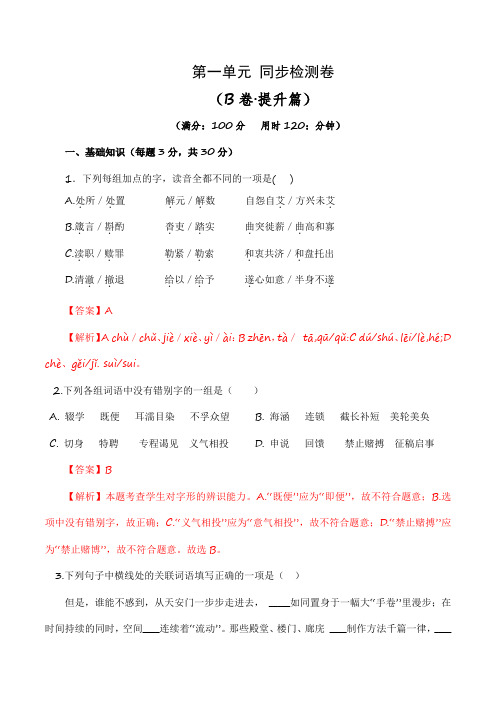
第一单元同步检测卷(B卷·提升篇)(满分:100分用时120:分钟)一、基础知识(每题3分,共30分)1.下列每组加点的字,读音全都不同的一项是()A.处.所/处.置解.元/解.数自怨自艾./方兴未艾.B.箴.言/斟.酌沓.吏/踏.实曲.突徙薪/曲.高和寡C.渎.职/赎.罪勒.紧/勒.索和.衷共济/和.盘托出D.清澈./撤.退给.以/给.予遂.心如意/半身不遂.【答案】A【解析】A chù/chǔ、jiè/xiè、yì/ài:B zhēn,tà/ tā,qū/qǔ:C dú/shú、lēi/lè,hé;D chè、gěi/jǐ. suì/sui。
2.)A. 辍学既便耳濡目染不孚众望B. 海涵连锁截长补短美轮美奂C. 切身特聘专程谒见义气相投D. 申说回馈禁止赌搏征稿启事【答案】B【解析】本题考查学生对字形的辨识能力。
A.“既便”应为“即便”,故不符合题意;B.选项中没有错别字,故正确;C.“义气相投”应为“意气相投”,故不符合题意;D.“禁止赌搏”应为“禁止赌博”,故不符合题意。
故选B。
3.下列句子中横线处的关联词语填写正确的一项是()但是,谁能不感到,从天安门一步步走进去, _____如同置身于一幅大“手卷”里漫步;在时间持续的同时,空间____连续着“流动”。
那些殿堂、楼门、廊庑 ____制作方法千篇一律,____每走几步,前瞻后顾、左睇右盼,那整个景色的轮廓、光影,____都在不断地改变着,一个接着一个新的画面出现在周围,千变万化。
A. 却还即使可也B. 就也虽然却还C. 却也即使然而也D. 就也虽然然而却【答案】D【解析】本题考查对关联词语运用的能力。
“从天安门一步步走进去”与“如同置身于一幅大‘手卷’里漫步”是承接关系,故选“就”,排除AC;“每走几步,前瞻后顾、左睇右盼,那整个景色的轮廓、光影”与“都在不断地改变着,一个接着一个新的画面出现在周围,千变万化”是转折关系,故排除B。
- 1、下载文档前请自行甄别文档内容的完整性,平台不提供额外的编辑、内容补充、找答案等附加服务。
- 2、"仅部分预览"的文档,不可在线预览部分如存在完整性等问题,可反馈申请退款(可完整预览的文档不适用该条件!)。
- 3、如文档侵犯您的权益,请联系客服反馈,我们会尽快为您处理(人工客服工作时间:9:00-18:30)。
第一单元B卷」(满分120分)一、选择训练(共15小题,每小题1分,共15分)1.红色字读音有误的一项是( )A.储(chǔ)存薪(xīn)水酱(jiàng)油约(yāo)二斤鸡蛋B.镊(niè)子惊闺(guī) 街坊(jiē fang) 安土重(zhòng)迁C.挪(nuó)窝房檩(lǐn) 伺(sì)候噌(cēng)的一声D.庠(xiáng)序 坍塌(tān tā) 虾蟆(háma) 胡同之没(mò) 2.选择书写正确的一组( )A.呈现 干皱 寂寞 奇耻大辱B.遗迹 凝固 石碑 鲜嫩润择C.楚词 艳丽 苍烟 瞬息万变D.藤萝 花瓣 桔梗 满怀热眈3.选择用词正确的一组( )(1)右侧在夏天是一片荷塘,现在也只剩下了冬日的__________。
(2)悄立“塔”下,觉得人是这样渺小,天地是这样__________。
风在路另侧的小树林中__________,忽高忽低,如泣如诉。
(4)浅淡的光,照在框外的冰上,使人想起月色的__________。
A.凄冷 广阔 呼啸 冷清B.清冷 广阔 呼啸 凄清C.凄冷 广阔 呼啸 清冷D.清冷 开阔 呼啸 凄清4.下列句子运用的修辞手法不同于其他三句的一项是( ) A.黄山松铁骨冰肌;异萝松天下罕见。
B.几枝松,几个观松人,溶出溶入;一幅幅,有似古山水,笔意简洁。
C.一刹那火球腾空,凝眸处彩霞掩映。
D.高峰下临深谷;幽潭傍依天柱。
5.下面破折号的用法不同类的一项是( )A.可是,直到今年──五十多岁了,才有机会第一次穿过三峡。
B.这江水……当它以摧山坼地之力凿开三峡洋洋东去之时,可曾想到后来竟变成那渺小的生物──人的胯下坐骑么?C.不要小看第一个……人,他们越过了人类儿童时代一座又一座真正的“三峡”──不,他们的步履更为艰难,他们的业绩更为伟大。
D.他们被一个钢铁的意志──党的意志团结在一起,正在向新的“三峡”进军。
6.依次填入下列各句横线处的词语,恰当的一组是( )①北京人爱热闹,但是不爱管闲事。
他们总是__________,冷眼旁观。
②北京胡同文化的精义是“忍”。
__________,逆来顺受。
③还有个章法没有?我可是当了一辈子安善良民,从来__________。
A.置之不理 安分守己 和和气气B.置身事外 安分守己 奉公守法C.置之度外 安分守己 和和气气D.含糊其辞 安分守己 奉公守法7.《胡同文化》的语言有的朴实,有的典雅。
两者互相结合,富有表现力。
品味下列语句的丰富内涵,分析有误的选项为( ) A.虾米皮熬白菜,嘿!一个“嘿”字,充分表现了北京市民吃了虾米皮熬白菜之后的那种极其满足感,证明了“北京人易于满足,他们对物质的要求不高”的看法。
B.睡不着,别烦躁,别起急,眯着。
北京人,真有你的!对别人无可奈何,只能自我安慰,充分表现了北京人的那种忍耐性格,最后“北京人,真有你的”是作者对北京人的这一性格进行评论的话,有局外人的佩服和赞叹。
C.西风残照,衰草离披,满目荒凉,毫无生气。
尽情渲染胡同衰败没落后的凄惨景象,引起人们的伤感怀旧之情。
D.哪儿也比不了北京。
北京的熬白菜也比别处好吃,──五味神在北京。
通过一位阅历丰富的老人之口,北京人骄傲自大的神气毫厘毕现。
8. 下面红色的词语意思基本相同的一组是( )A. (1)人类的历史,对于我本来如同远在云天之上,不可端睨的飞鸟。
(2)时间过去了半年多,事情已初露端睨。
B. (1)它以摧山坼地之力凿开三峡洋洋东去。
(2)一部《水浒传》,洋洋洒洒百万言,作者却并不滥用笔墨。
C. (1)我凭舷眺望,望着茫茫的江水。
(2)多年来,我也常想到汨罗江一游,凭吊屈原投江的地方和为纪念他而建的屈子祠。
D. (1)历史在前进中,不免有摇头者,有叹气者,有彷徨者,有哭泣者。
(2)那一天,我独在礼堂外徘徊,遇见程君。
9.给下面一段文字划分层次,最正确的一项是( )(1)我们生活在一个开辟人类新历史的光辉时代。
(2)在这样的时代,人们对许许多多的事物都产生了新的联想、新的感情。
(3)不是有许多人在讴歌那光芒四射的朝阳、四季常青的松柏、庄严屹立的山峰、澎湃翻腾的海洋吗?(4)不是有好些人在赞美挺拔的白杨、明亮的灯火、奔驰的列车、崭新的日历吗?(5)睹物思人,这些东西引起人们多少丰富和充满感情的想象!A. (1)/(2)/(3)(4)/(5)B. (1)(2)/(3)(4)/(5)C. (1)/(2)(3)(4)/(5)D. (1)/(2)(3)/(4)(5)10.下列词语中红色字解释正确的一项是( )A.不约而同:约,约定。
B.安土重迁:重,重新。
C.冷眼旁观:冷,冰冷。
D.忠心耿耿:耿耿,心事重。
11.《胡同文化》一文中,作者认为北京胡同文化的精义是( )A.忍。
B.安分守己C.逆来顺受D. “有理让三分”,“得饶人处且饶人”12.“‘睡不着眯着’这话实在太精彩了!睡不着,别烦燥,别起急,眯着。
北京人,真有你的!”言有尽而意无穷。
对这段话的理解有误的一项是( )A.生动的口语, 具有“谈话风”的特点。
B.体现了北京人用儒道互补精神对待事物。
C.把北京人凡事不必太认真、不必太放在心上的心理揭示得活灵活现。
D.体现了作者对北京人由衷的钦佩之情。
13.“船出了夔门,忽然落进另一个天地”句中“忽然”一词的作用主要是( )A.表明船行速度之快B.表明景物变化之大C.写出了水势落差之大D.写出了感情变化之大14.《废墟的召唤》中,作者凭吊废墟的目的是( )A.通过对圆明园废墟的描绘,意在引起人们对像圆明园一样的废墟的关注,并付诸行动改变它。
B.引起人们对像圆明园废墟一样凝固的事物的关注,召唤起一种积极改革、弃旧更新、寻求新的建设和发展的时代精神。
C.宣扬废墟的警示作用,呼吁人们正视废墟。
D.让人们铭记历史,勿忘国耻。
15.关于《废墟的召唤》题目的解说,错误的一项是( ) A.文章的题目借“废墟的召唤”来暗示对改革的呼唤。
B.也是在呼唤人们为处于落后状态的祖国和民族奉献自己的聪明才智。
C.题目体现了文章的主旨,主要是在告诫人们牢记历史不要忘记过去。
D.号召人们“先天下之忧而忧,后天下之乐而乐”。
二、填空训练(共10小题,每小题2分,共20分)1.胡同文化的精义是“()”,是(),()。
2.《胡同文化》文中反映的胡同文化的真正含义是:北京人或者说是我们中国人()的思想意识。
3.框外()的西山,这时却全呈黛青色,(),一派()的模样,似与这黄昏全不相干。
4.()如酒,()如梦。
那不浓不淡处使想起春日的(),这铺天的()需要多少个藤萝()啊。
5.行程是艰险的。
历史在前进中,不免有(),有(),有(),有()。
6.《废墟的召唤》作者是()代()作家()原名()。
7.“废墟的召唤”运用了()的手法,写了一个()、()、()的“废墟”。
8.胡同文化的真正含义:()。
9.《过万重山漫想》是一篇(),但它不同于一般的()其特点在于()。
10.《废墟的召唤》一文中废墟召唤的是一种()的精神。
三、判断题(共8小题,每小题1分,共8分)1.《胡同文化》用朴实雅致、富有表现力的语言叙事抒情。
2.《把栏杆拍遍》是一篇带有小说性质的文章,塑造了一个叱咤风云而又命运多舛的爱国词人辛弃疾的形象,揭示了辛弃疾怎样从一个爱国志士成为爱国词人的过程及原因。
3.春秋战国时期,汉族使用兵车作战,还不习惯于骑马。
于是,有了北魏拓跋珪的“胡服骑射”。
4.《内蒙访古》是一篇游记。
5.《内蒙访古》语言简洁流畅、活泼生动;《把栏杆拍遍》语言富于形象性和节奏感,具有很强的表现力。
6.“把栏杆拍遍”语出辛弃疾的《青玉案》。
7《胡同文化》整篇文章只有“看看这些胡同的照片”九个字,表明这是一篇序,作者并没有把这篇文章当作正儿八经的序来写,呈现在读者眼前的,是一篇充分显示作者个性风格的小品文。
8.促使辛弃疾成就了一个千古爱国词人的主要因素是辛弃疾个人的才能和思想。
四、简答题(共6小题,每小题2分,共12分)1.《废墟的召唤》文章前面说“它该让出地方,好建设新的一切”,后文却说“能不能留下一部分废墟呢?最好是远瀛观一带,或只是这座断桥,也可以的”,这样行文前后是否矛盾?为什么?2.《废墟的召唤》中“召唤”具体指的什么内容?3.“过万重山漫想”,“漫想”的起点在何处?终点又在何处?作者是在什么情形下开始漫想的?4.《内蒙访古》一文,作者是怎样评价赵武灵王的,理由是什么?5.“修长城”和“胡服骑射”的重要性是一样的吗?哪一个更重要?为什么?6.《胡同文化》一文中胡同文化的特点是什么,作者是如何从“胡同”里发现“文化”意蕴的?五、阅读题(共2道题,每题10分,共20分)(一)①胡同和四合院是一体。
胡同两边是若干四合院连接起来的。
胡同、四合院,是北京市民的居住方式,也是北京市民的文化形态。
我们通常说北京的市民文化,就是指的胡同文化。
胡同文化是北京文化的重要组成部分,即使不是最主要的部分。
②胡同文化是一种封闭的文化。
住在胡同里的居民大都安土重迁,不大愿意搬家。
有在一个胡同里一住住几十年的,甚至有住了几辈子的。
胡同里的房屋大都很旧了,“地根儿”房子就不太好,旧房檩,断砖墙。
下雨天常是外面大下,屋里小下。
一到下大雨,总可以听到房塌的声音,那是胡同里的房子。
但是他们舍不得“挪窝儿”,──“破家值万贯”。
1.①②两段的中心句,分别是:(1)第①段的中心句为(不超过30字)(2分):(2)第②段的中心句为(限12字)(1分):2.从语序的角度分析,第①段有一个倒装式句子,请注意筛选:(1)这个句子的倒装部分为(1分):(2)若将全句梳理和调整一下,其正常语序为(2分):3.语段告诉我们胡同里的居民有何种心态?其封闭性表现在何处?(1)居民的心态,可概括成两个方面,即:①.;(不超过12字)(1分)b.。
(5字)(1分) (2)胡同文化从居民身上体现出来,其封闭性也表现为两点,它们是: ①.;(限15字)(1分)②.。
(限18字)(1分)(二)①我不由得停住了脚步。
②从未见过开得这样盛的藤萝,只见一片辉煌的淡紫色,像一条瀑布,从空中垂下,不见其发端,也不见其终极。
只是深深浅浅的紫,仿佛在流动,在欢笑,在不停地生长。
紫色的大条幅上,泛着点点银光,就像A(溅落、迸溅、溅起)的水花。
仔细看时,才知那是每一朵紫花中的最浅淡的部分,在和阳光互相B(映衬、逗乐、挑逗)。
③这里春红已谢,没有赏花的人群,也没有蜂围蝶阵。
有的就是这一树闪光的、盛开的藤萝。
花朵儿一串挨着一串,一朵接着一朵,彼此推着挤着,好不活泼热闹!④每一穗花都是上面的盛开、下面的待放。
颜色便上浅下深,好像那紫色沉淀下来了,沉淀在最嫩最小的花苞里。
